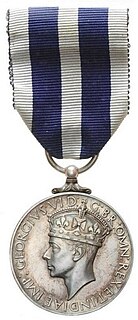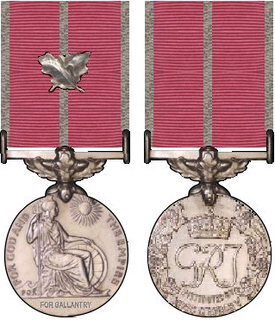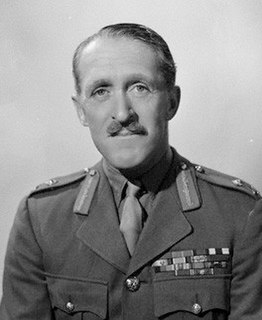Related Research Articles

The Most Excellent Order of the British Empire is a British order of chivalry, rewarding contributions to the arts and sciences, work with charitable and welfare organisations, and public service outside the civil service. It was established on 4 June 1917 by King George V and comprises five classes across both civil and military divisions, the most senior two of which make the recipient either a knight if male or dame if female. There is also the related British Empire Medal, whose recipients are affiliated with, but not members of the order.

The George Cross (GC) is the second highest award of the United Kingdom honours system awarded "for acts of the greatest heroism or for most conspicuous courage in circumstance of extreme danger", not in the presence of the enemy, to members of the British armed forces and to British civilians. Posthumous awards have been allowed since it was instituted. It was previously awarded to residents of Commonwealth countries, most of which have since established their own honours systems and no longer recommend British honours. It may be awarded to a person of any military rank in any service and to civilians including police, emergency services and merchant seamen. Many of the awards have been personally presented by the British monarch to recipients or, in the case of posthumous awards, to next of kin. These investitures are usually held at Buckingham Palace.

The George Medal (GM), instituted on 24 September 1940 by King George VI, is a decoration of the United Kingdom and Commonwealth, awarded for gallantry "not in the face of the enemy" where the services were not so outstanding as to merit the George Cross.

The British Empire Medal is a British medal awarded for meritorious civil or military service worthy of recognition by the Crown. The current honour was created in 1922 to replace the original medal, which had been established in 1917 as part of the Order of the British Empire.

The Queen's Police Medal (QPM) is awarded to police in the United Kingdom for gallantry or distinguished service. It was also formerly awarded within the wider British Empire, including Commonwealth countries, most of which now have their own honours systems. The medal was established on 7 July 1909 as the King's Police Medal (KPM), initially inspired by the need to recognise the gallantry of the police officers involved in the Tottenham Outrage. Renamed the King's Police and Fire Services Medal (KPFSM) in 1940, it was replaced on 19 May 1954 by the Queen's Police Medal (QPM), when a separate Queen's Fire Service Medal was also instituted.

The Naval Armament vessel formerly RFA Bedenham was a naval armament carrier that exploded while docked in Gibraltar on 27 April 1951, killing 13 people and causing a great deal of damage to the town.

The Medal of the Most Excellent Order of the British Empire for Gallantry, usually known as the Empire Gallantry Medal (EGM), was a British medal awarded for acts of the gallantry that did not reach the standard required for the Albert Medal and the Edward Medal. King George V introduced it on 29 December 1922. Recipients were entitled to use the post-nominal letters "EGM" and as a Medal of the Order of the British Empire it was also divided into military and civil divisions. Unlike appointments to the Order of the British Empire it could be awarded posthumously.
The Victoria Cross for Australia is the highest award in the Australian Honours System, superseding the British Victoria Cross for issue to Australians. The Victoria Cross for Australia is the "decoration for according recognition to persons who in the presence of the enemy, perform acts of the most conspicuous gallantry, or daring or pre-eminent acts of valour or self-sacrifice or display extreme devotion to duty."
Captain Alexander Mitchell ("Sandy") Hodge was a recipient of the Empire Gallantry Medal, later exchanged for the George Cross.

The Meritorious Service Medal (MSM) is a silver medal for distinguished service, or for gallantry, principally by non-commissioned officers of all of the British armed forces and of Queen Alexandra's Royal Naval Nursing Service.
Ernest Oliver Gidden,, known as Mick Gidden, was awarded the George Cross for the "great gallantry and undaunted devotion to duty" he showed while defusing mines and bombs during the Blitz in London. He served at HMS President with the Royal Navy Volunteer Reserve and was cited for making safe a mine that had fallen on Hungerford Bridge on 17 April 1941.
Arthur Gerald Bagot, was an Australian naval officer and farmer. He was an exchange recipient of the George Cross, the highest civil decoration for heroism in the United Kingdom and formerly in the Commonwealth. In 1918, while serving as a lieutenant in the Royal Naval Volunteer Reserve during the First World War, Bagot and Lieutenant Robin Hoare battled flames to remove depth charges from ML 356 after its engine room had exploded. The pair were credited with preventing a further explosion and thus potential casualties, and were subsequently awarded the Albert Medal. In 1971, the British Government announced that the Albert Medal would be discontinued and living recipients would henceforth be regarded as holders of the George Cross. The change came into effect from 21 October, and living recipients were accordingly invited to exchange their medals; Bagot took up the offer.

Frederick Hamilton March, was an Australian soldier and adventurer. He served in the Middle East during the First World War. He received the Empire Gallantry Medal, then the highest civilian gallantry award in the British Empire, for his conduct during the assassination of the Governor-General of Sudan, Sir Lee Stack. He was involved with the Sudanese Ministry of Agriculture during his later working career.
Lieutenant Commander Keith Robin Hoare, was a Royal Navy officer and a recipient of the Albert Medal, formerly a high level decoration of the United Kingdom and Commonwealth awarded for gallantry in saving life. Hoare was awarded the Albert Medal in 1918 for his actions in removing depth charges from HM Motor Launch 356 after its engine room exploded, despite the flames, thus preventing a further explosion. With the establishment of the George Cross in 1940, the Albert Medal was discontinued.
Gordon Love Bastian, was an engineering officer in the British Merchant Navy who was awarded the Albert Medal for risking his own life to save other members of the crew of SS Empire Bowman after it was torpedoed on 31 March 1943. In 1971, living recipients of the Albert Medal and Edward Medal were instructed to return their medal and were instead issued with the George Cross, the highest decoration for gallantry awarded to civilians or to military personnel for actions "not in the face of the enemy" in the United Kingdom and Commonwealth

Major General William Donovan Stamer CB, CBE, DSO, MC was a British Army officer who was commissioned into the North Staffordshire Regiment at the outbreak of the First World War and served in the Army until retirement in 1948, finishing his career with the temporary rank of major-general and serving as General Officer Commanding Sudan and Eritrea.
James Gordon Melville Turner GC was a British merchant seaman. He was awarded the Empire Gallantry Medal (EGM) for actions on the cargo ship Manaar on 6 September 1939. The ship was one of the first British merchantmen sunk during the Second World War. The award of the EGM was gazetted on 13 October 1939, and the medal was exchanged for the George Cross (GC) in 1943. Turner was also awarded the Lloyd's War Medal for Bravery at Sea, and a gold medal by the Liverpool Shipwreck and Humane Society.

Lieutenant General Yogesh Kumar Joshi, UYSM, AVSM, VrC, SM, ADC is a serving General Officer in the Indian Army. He is the current General Officer Commanding-in-Chief Northern Command, assuming office from Lt Gen Ranbir Singh on 1 February 2020. He last served as the Chief of staff of the Northern Command, assuming the office from Lt Gen SK Sharma. Previously, he was the commander of Leh based Fire & Fury Corps.
Dorothy Louise Thomas GC was a British nurse awarded the Empire Gallantry Medal (EGM) for her actions preventing a major incident at the Middlesex Hospital in January 1934.
William John Button was a British soldier and one of the last recipients of the Empire Gallantry Medal before this award was superseded by the George Cross.
References
- 1 2 3 "GC Diary 4th Jan" . Retrieved 24 February 2019.
- ↑ "No. 34296". The London Gazette (Supplement). 19 June 1936. p. 4010.
- 1 2 "El Amin Effendi Hemeida EGM". VC Online. Retrieved 24 February 2019.
- ↑ "Aerospace 1". Antiques Roadshow. Series 41. Episode 9. 24 February 2019. BBC television . Retrieved 24 February 2019.